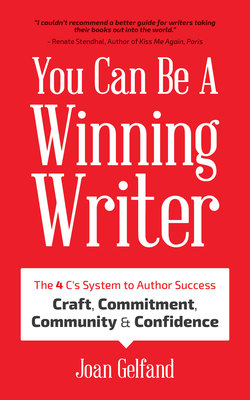Читать книгу You Can Be a Winning Writer - Joan Gelfand - Страница 6
На сайте Литреса книга снята с продажи.
ОглавлениеForeword
As I sat reading Joan Gelfand’s You Can Be a Winning Writer in preparation for writing this foreword, I decided that I needed to stop and get on with writing it. But fascinated, I couldn’t. Instead, I found myself nodding yes, yes, yes at every paragraph, and often stopping to jot down especially meaningful lines to share with the women and sometimes men in the Zona Rosa Writing and Living Workshops I’ve led for thirty-seven years.
In this book, Gelfand beautifully and concisely addresses the four seemingly contradictory parts of every successful writer’s life: Craft, Commitment, Community and Confidence—the first two we hone in solitude, our butt in a chair or our nose in book after book; the second two when we put ourselves out into the world to join forces with our literary peers and heroes (who, as she mentions, sometime become friends and supporters). Over and over, she nails the myth of the solitary artist, and rarely has an author described so succinctly what we need as writers—from initial inspiration to the long haul of publication.
As I read, memories of my own early years as a writer flooded through me, and I realized afresh how fortunate I had been to have had all four of Gelfand’s requirements on my side. As a mother of three, a woman afflicted with post-partum depression, and a high school dropout who had never heard of Emily Dickinson or T.S. Eliot, after I took a class in Modern Poetry at Emory University and the professor read work from great modern poets, I was evangelized in a way I never had been in the Bible Belt Baptist Church I’d grown up in. Next, I took a poetry workshop, and while my kids were in nursery school each day, I wrote and rewrote the poems that had begun pouring out of me and copied poems I loved into notebooks, analyzing how their authors had written them. Craft and Commitment by then became my obsession.
Shortly after, my teacher—a grad student destined to become a well-known poet himself—invited me to join a writing workshop. The workshop ended up being made of Emory professors and their wives—PhDs who laughed when I could neither pronounce nor spell Nietzsche, enunciated Oedipus Rex as “O-ped-ius Rex,” and when I explained why I’d put an “ejaculation” point at the end of each line. Nevertheless, they supported my work, providing Community and Confidence. Indeed, I was the perfect example of Samuel Clemens’ (a.k.a., Mark Twain’s) words, “With ignorance and confidence, success is certain.”
Thereafter, and many times during my decades as a writer, Gelfand’s Four C’s for being a winning writer have played themselves out in my life. For example, when I bought my first manual typewriter (on time, and yes, it was that many years ago!) and a typewriter table, and then, twelve years later, when I rented a room away from home in which to finish my first collection of poems (Craft and Commitment again). “If you’re good enough, you’ll be published,” my first editor Jennifer said to me, inspiring me to work harder.
Several years later, published in both memoir and fiction, I gave myself over to the excitement and pleasure of promoting my second, third, and other books on book tours. The same book tours that put me—after years spent in solitude at my desk—on national television and at large literary venues, calling again on the need for Community and Confidence. While reading You Can Be a Winning Writer, I realized afresh what a large part—and how constantly, as though in a rhythmic dance—Gelfand’s Four C’s have played in my writing life. (And a special note: Gelfand, like me, was a poet first. And she, like me, recommends writing and/or reading poetry—the most concise literary form—to every writer, whatever his or her chosen genre may be.)
Dense with great examples, bountiful in its outpouring of concrete advice, and full of the joy of being part of a special tribe, You Can Be a Winning Writer is the book I wish I had when I first fell in love with the art of writing. It is a book in which every writer will find the help and inspiration they need—wherever they may be on their writing journey—and I will recommend it time and time again.
Rosemary Daniell
